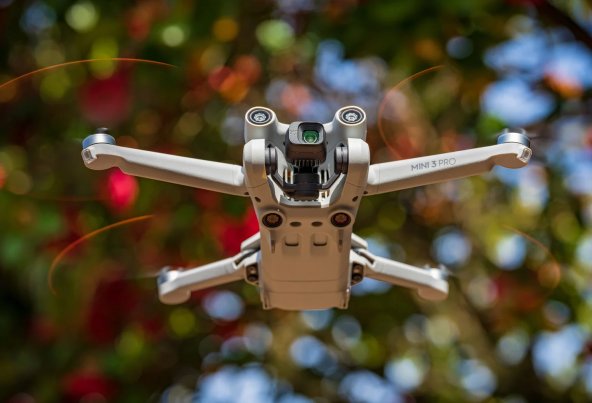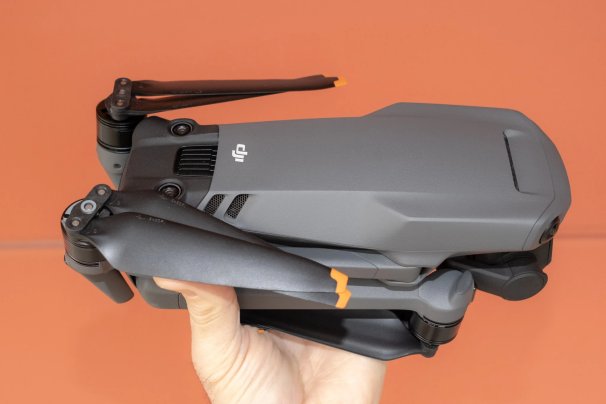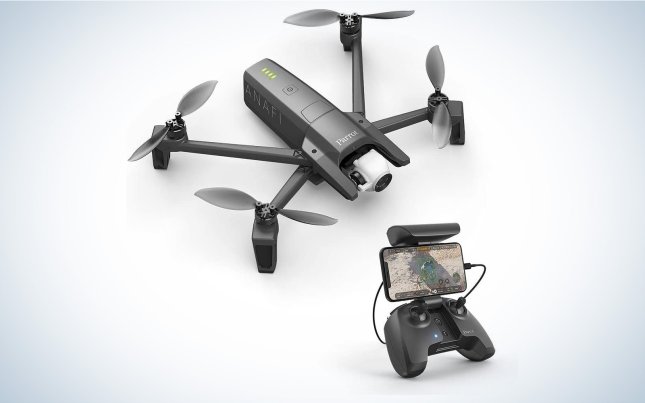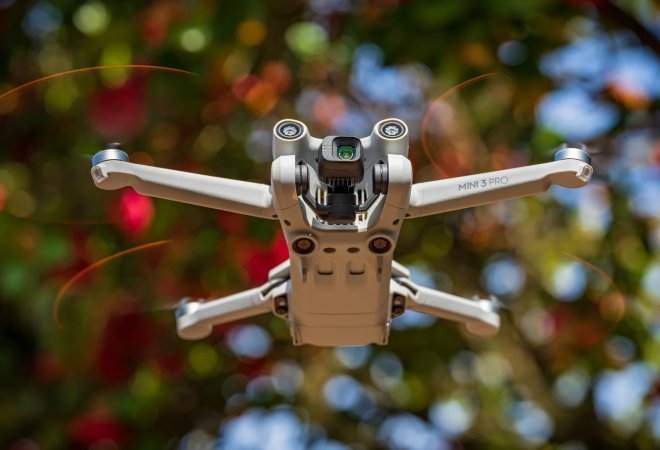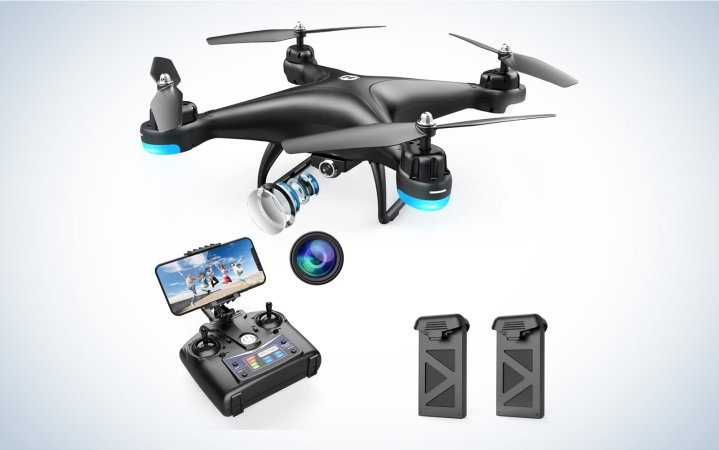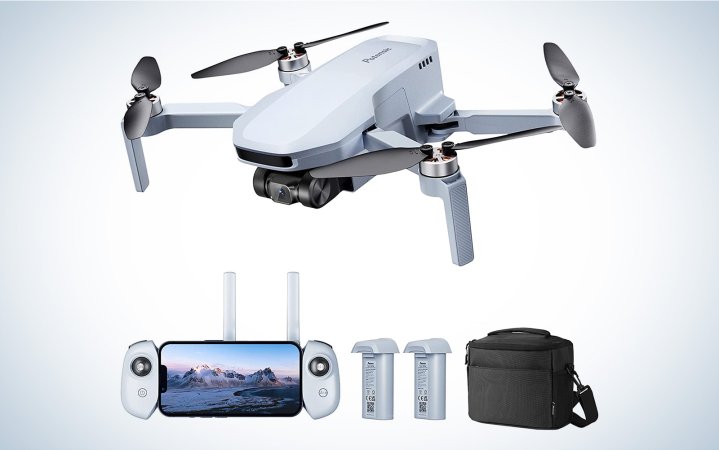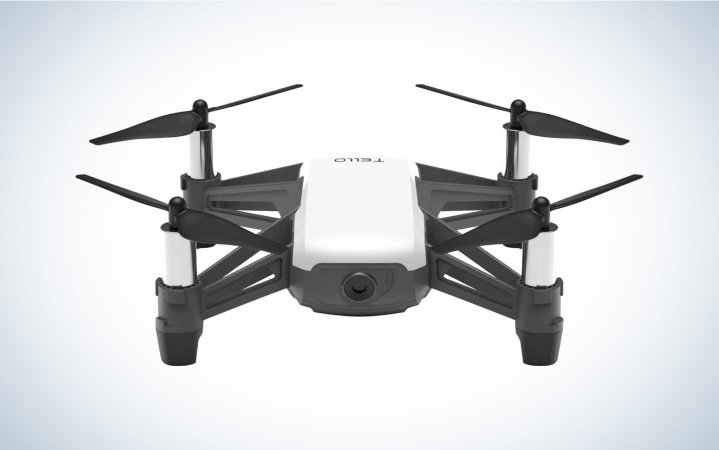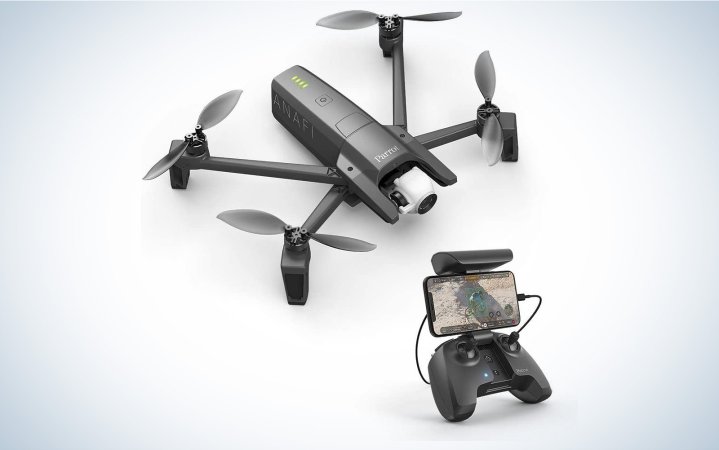We may earn revenue from the products available on this page and participate in affiliate programs. Learn more ›
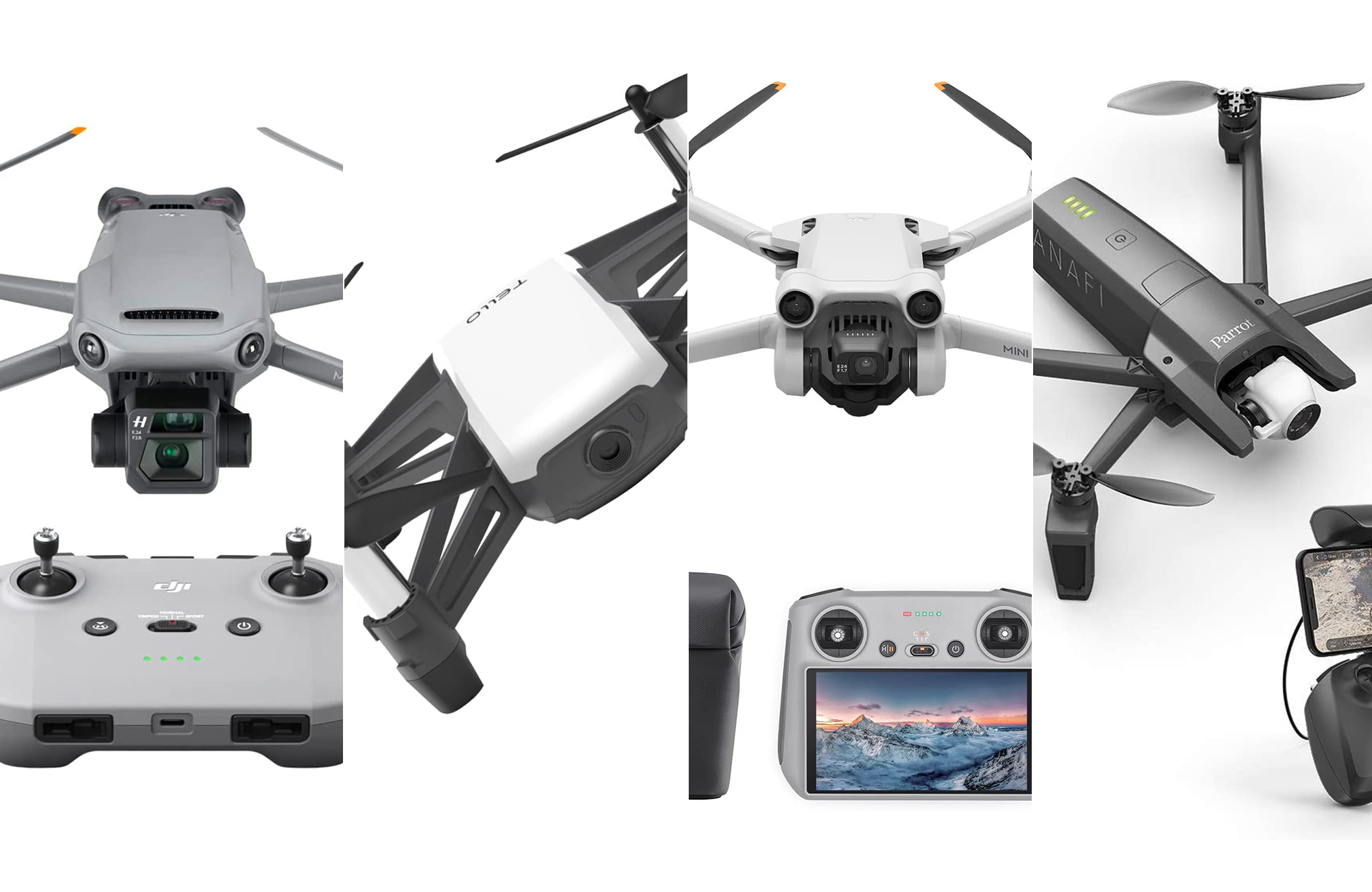
Travel drones aren’t just for professional creatives anymore. In the last few years, these pint-sized crafts have become widely accessible thanks to compact and budget-friendly options hitting the market. A travel drone is a great way to capture photos and footage with unique perspectives while you are on the road. It’s a great tool for travel vloggers, filmmakers, or families looking for a way to keep kids entertained on vacation. While you can go seriously Hollywood with your purchase, we think the best drone options are either so compact that they don’t even need to be registered with the FAA or feature a foldable design that makes them easy to slide into a camera backpack. Price can vary widely depending on what types of advanced features that drone might include and the manufacturer. A higher-end consumer drone will typically cost about $2K, while budget options can be as low as $100. In this buying guide, you will find the best travel drones that fit various budgets and use cases.
- Best overall: DJI Mini 3 Pro
- Best budget: Holy Stone HS110D FPV RC Drone
- Best budget mini: Potensic Atom SE
- Best for professionals: DJI Mavic 3
- Best for beginners: Ryze Tech Tello Mini Drone
- Best for photos: Parrot Anafi
How we chose the best travel drones
When selecting the products in this buying guide, it was important to select a combination of compact travel drones (that don’t need to be registered with the FAA) and a few full-sized drones aimed at a professional user. We selected products that would fit a range of budgets and skill levels and represented different brands currently on the market. When selecting the drones in this buying guide, we also considered flight time, video capture capability, and advanced features that make specific models stand out in the field. Camera quality and functionality play a key role in our selections. The products that appear in this guide were selected through a combination of hands-on experience, editorial reviews, and user feedback.
The best travel drones: Reviews & Recommendations
While we offer specific recommendations depending on your usage, many of the drones on this list will work for several kinds of pilots. Be sure to check out the entire list before making a purchase to make sure you’re getting what you need out of your new flying machine.
Best overall: DJI Mini 3 Pro
DJI Mini 3 Pro
Pros
- No need to register with FAA
- Small and compact
- Vertical shooting capabilities
- Dedicated controller
- Wind resistant up to 38kph winds
Cons
- Expensive for size
- Visibility in air could be improved
Specs
- Weight: Under 249 grams
- Flight Time: 38 minutes
- Video: 4K
The DJI Mini Pro 3 claims our spot as best overall travel drone due to its compact size, substantial flight time, and advanced features like 3-way obstacle avoidance. And because this particular drone is under 249 grams, there’s no need to register it with the FAA before you take to the skies. The impressive 38-minute battery life can be extended to 51 minutes when used with the Intelligent Flight Battery Plus—a flight time unheard of for most compact drones on the market. It can shoot 4K/60fps video and capture 48-megapixel RAW images; it also features vertical shooting—ideal for capturing social videos for TikTok or Instagram stories. A variety of QuickShot modes make it easy to capture panoramas and pre-programmed dynamic flight patterns. It has a fast F/1.7 lens, which means it will perform well at sunset or on overcast days, plus it features wind resistance up to 38kph so that it can withstand a bit of turbulence. The DJI Mini Pro 3’s all-in-one RC-N1 controller has a nicely sized 5-inch screen, eliminating the need to use your smartphone while flying. The DJI Mini Pro packs pro-level features into a super compact package that can easily fit into a camera backpack. Although it’s on the pricey side for its size, we think the advanced features make it a worthy investment for taking on your next adventure.
Read our full review: DJI Mini Pro 3
Best budget: Holy Stone HS110D FPV RC Drone
Holy Stone HS110D drone
Pros
- Affordable price point
- Easy-to-use controller
- Compact size
- No need to register with FAA
- In air flip mode
Cons
- No wind resistance
- Limited flight time
Specs
- Weight: 149 grams
- Flight Time: 20 minutes
- Video: 1080p
The Holy Stone HS110D FPV RC Drone is a great option if you are looking for a travel drone that won’t break the bank. At under $100, this is one of the most affordable compact drones on the market. Its compact size also means it doesn’t require registration with the FAA—making it a nice choice for care-free flying. The Holy Stone has a 120-degree “first-person view” camera and can shoot 1080p video. Flight time is shorter than other compact drones, and this drone lacks wind resistance, but this is to be expected, given the super low price point. The Holy Stone does include fun pre-programmed flight patterns like in-air flips, and features like altitude hold and landing assists. Intuitive in-app features allow users to control the drone through gestures or draw a flight path for the drone to follow. This is a great travel drone if you aren’t looking to spend a fortune to capture your out-of-town adventures.
Best budget mini: Potensic Atom SE
Potensic Atom SE
Pros
- Super light foldable design
- No FAA registration required
- GPS connectivity at an affordable price
Cons
- Image quality could be better; only 30 FPS
- User control interface has a bit of a learning curve
Specs
- Camera: 12 MP
- Video quality: 4K at 30 fps
- Max flight time: 31 minutes
- Onboard storage: None
The Potensic Atom SE folds down to just 3.5 x 5.6 x 2.3 inches and weighs less than the FAA’s registration limit of 250 grams. Those numbers make it one of the lightest and most compact drones we’ve ever tested. Like the DJI Mini 3 Pro, the Atom SE features built-in wind resistance that can keep the craft steady in gusts up to 38 kph. In more ideal wind conditions, it can stay airborn for up to 30 minutes on a single charge.
While the Atom SE’s camera shoots 4K video and offers decent still image quality for the money, it’s not the sharpest imagery we’ve seen from and the footage doesn’t tops out at 30 FPS. But, the positives still far outweigh the negatives. This drone’s built-in image stabilization performs very well, and we found the GPS connectivity and return-to-home features extremely reliable. Commanding the drone with the included controller is simple once it’s up in the air. The software and user interface, however, require a bit of studying and calibration before taking to the skies. The setup could be more straightforward. All in all, the Potensic Atom SE is a very solid choice for beginner drone users looking to learn the ropes and have fun while saving money and minimizing risk.
Best for professionals: DJI Mavic 3
DJI Mavic 3 Drone
Pros
- 4/3 CMOS Hasselblad Camera
- Advanced Omnidirectional Object sensing
- 15-kilometer transmission range
- Smart return to home feature
- Folding design
Cons
- Expensive, over 2K
- Requires registration with FAA
Specs
- Weight: 895 grams
- Flight Time: 46 minutes
- Video: 5.1K
If you are looking for a travel drone with all the pro-level features, look no further. The DJI Mavic 3 is the priciest option on our list, and because of its larger size must be registered with the FAA, but its foldable design still makes it an excellent option for travel. The DJI Mavic 3 is equipped with a 4/3 CMOS Hasselblad camera and a sensor that provides 12.8 stops of dynamic range—making for footage that has a lot more detail in both the highlights and the shadows. It can shoot 5.1K video up to 50fps, 4K video up to 120fps, and capture 20-megapixel 12-bit RAW stills. It has an impressive flight time of 46 minutes, a 15-kilometer transmission range, and advanced features like omnidirectional object sensing, with improved range—giving users way more time to react and prevent crashing into a tree while flying. Other pro-level features include Advanced Return To Home, which will automatically bring your drone back to you using the most energy-efficient route. Although the DJI Mavic 3 is expensive, the top-level features and impressive camera make it well worth the price point.
Read our full review: DJI Mavic 3
Best for beginners: Ryze Tech Tello Mini Drone
Ryze Tech Tello Mini Drone
Pros
- Lightweight build
- DJI-powered flight controller
- Good for kids
- No need to register with FAA
Cons
- Very short flight time
- No wind resistance
- Only capable of shooting 720p video
Specs
- Weight: 79.9 grams
- Flight Time: 13 minutes
- Video: 720p
Ryze Tech Tello Mini Drone Quadcopter is a great choice for the novice drone pilot. Although its flight time is much shorter than some of the other drones in this buying guide and video is limited to 720p, it’s extremely easy to operate. It also happens to have a DJI-powered flight controller for performing in-air tricks. The drone’s mobile programming app supports Scratch, which allows users to program corresponding movements using coding blocks. It can shoot 5-megapixel photos, and pre-programmed modes like Circle-360 and Up & Away make it easy to capture short clips even if you don’t know how to fly. Overall, this is a great starter drone for kids and adults who want to capture an aerial perspective while traveling.
Best for photos: Parrot Anafi
Parrot Anafi drone
Pros
- Capable of capturing 21-megapixel images
- Features timer and burst mode shooting options
- Folding design
- Built around a Sony CMOS sensor
Cons
- Limited flight time
- Not great in low light
- No wind resistance
Specs
- Weight: 707 grams
- Flight Time: 25 minutes
- Video: 4K
If you primarily want to capture photos with your drone, the Parrot Anafi is a great choice. It can shoot 4K video at 60fps, but it really shines as a tool for photographers. The Parrot Anafi is built around a Sony CMOS sensor with a unique camera that offers a vertical 180-degree field of view. It has a vertical folding design that makes it easy to slide into a backpack with other gear—making it an ideal choice for travel. The navigation app is intuitive and easy to use. The price point falls right in the middle of the pack, making this an appealing option for a wide variety of budgets.
What to consider when choosing a travel drone
When shopping for a travel drone, you should consider your budget and how you will be using the drone first and foremost.
Camera
We live in a 4K world at the moment, but camera tech doesn’t necessarily stop there. Some higher-end drones can capture 5K and beyond, allowing oversampled 4K footage with more detail or simply a bigger frame so you can crop in later while maintaining a full-res picture. Ideally, you’ll get 4K footage at 60fps with a reasonable megapixel count for photos. Of course, you’ll want to think about how you will use that footage later on. You may not need 4K at a high framerate if you’re trying to make a simple travel blog. In fact, it may hinder your editing process. Find a balance between easy edibility and high quality, then stick with it.
Weight
You’re traveling with these machines, so you want them to be as light as possible. Most only weigh a few pounds at most. But be sure to note the 250g threshold. A drone weighing 250 grams or more requires registration with the FAA before you can fly. Conveniently, our top pick on this list weighs 249 grams for this exact reason.
Obstacle avoidance
While drones have gotten easier to fly in recent years, you still have to navigate the learning curve. Unfortunately, tons of trees, houses, and power lines are littering that learning curve. Higher-end drones offer dedicated object avoidance systems that automatically stop a craft from smacking into something it shouldn’t. Top-tier models offer object avoidance in almost every direction, but more consumer models typically only see in front of them and sometimes to the side. It’s a nice touch if you’re learning and want to minimize possible damage.
Range
Some high-end drones can go nearly 20 miles away from their pilots, but local regulations and practical considerations make that unlikely for most users. If you’re considering two drones and opting toward one because it has a longer range, just be sure you will need that range. If all you plan is to fly it up into your neighborhood or over the lake, you don’t need a massive flight area.
Flight time
Drone batteries are small, and the juice inside can fade fast if conditions are less than perfect. Every gust of wind or fancy maneuver requires more power to execute. Our top pick, the DJI Mini 3 Pro, promises “up to 34 minutes” of flight time, but that “up to” is doing a lot of work. Add wind or complex movements, and that will drop quickly. You also couldn’t stay fully airborne for 34 minutes unless you’re cool with the craft falling out of the sky once the battery is exhausted.
Should you buy the Fly More combo?
DJI typically offers its drones on their own or as part of a Fly More combo, which includes a carrying case, extra rotors, and (most importantly) extra batteries. The Fly More combos typically offer a better deal than buying all the products together. And since you’re definitely going to want extra batteries (and a dedicated charger that can handle more than one cell at once), we recommend you invest upfront.
FAQs
Generally speaking, the more expensive a drone is, the longer it will be able to stay in the air and have a longer transmission signal. Consumer drones that are best for long-distance flying include the DJI Mavic 3, which has a 15-kilometer transmission range and an impressive flight time of 46 minutes. While toy drones have a much more limited transmission range and flight time. Regardless of how far you are flying a drone, it’s important to keep it within sight.
Even if you are flying a compact drone that doesn’t need to be registered with the FAA, there are a number of things that you should avoid. You should keep your drone at or below 400 feet and have it within sight while flying. Don’t fly drones near airports, in restricted airspace, near emergency response efforts, or over stadiums or sporting events. Although many drones feature wind resistance, it’s also best to avoid flying your drone in inclement weather.
If you are looking for a fun way to capture images and video footage away from home, a compact travel drone is a great way to do it. Whether you are bringing along an ultra-compact drone that doesn’t need to be registered with the FAA, or a more advanced foldable drone—these flying machines offer a unique perspective. Yes, we absolutely think that travel drones are worth the investment.
Final thoughts on the best travel drones
- Best overall: DJI Mini 3 Pro
- Best budget: Holy Stone HS110D FPV RC Drone
- Best budget mini: Potensic Atom SE
- Best for professionals: DJI Mavic 3
- Best for beginners: Ryze Tech Tello Mini Drone
- Best for photos: Parrot Anafi
A travel drone is a great way to capture unique aerial perspectives with ease and is a worthy investment for travel vloggers, filmmakers, or families looking for a fun way to document their vacation. The DJI Mini 3 Pro takes the cake for being the best overall travel drone thanks to its impressive flight time, compact size, and video and photo capabilities. Although it’s small enough that you don’t need to register it with the FAA before you fly, it still manages to pack many pro-level features into its tiny body. If you are interested in a travel drone to capture your adventures, we recommend checking out any of these top options.
